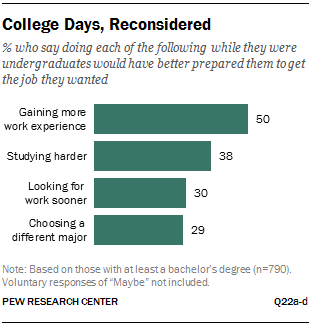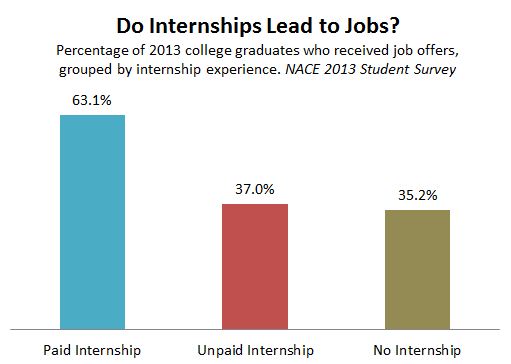“Permatern” is the new label for a college graduate who spends years in her 20s working for a minimal stipend or for free. This pattern seems to have become more common for some liberal arts college graduates seeking jobs in media, the arts, and other fields, particularly in the metro areas of New York City, Los Angeles, and Washington D.C.
Kate, with a degree in political science from an Ivy League school, was recently profiled in The Week.
She had one internship at a political organization and another at a media company and is now an unpaid intern at a lobbying firm. To make ends meet, she works as a hostess three or four nights a week, which means she often clocks 15-hour days.
Lacking a steady paycheck and benefits
… After all, who wants to still be an intern at an age when you should have a 401(k) and a modicum of job security, or at least be earning more than you did at your summer job during high school? …
When I ask Kate how many jobs she’s applied for, she says, “Like a million.”
Permaterns are sometimes counted in the growing numbers of underemployed college graduates.
Desperate as she is, the Department of Labor doesn’t consider her to be unemployed, because she has two jobs. Instead, Kate, who often works more than 60 hours a week, is in a class of workers who don’t show up in government reports. She’s one of the “permaterns” — those perpetual interns, mostly in their 20s — who have been battered by the recession and are holding out hope that the conventional career wisdom that an internship leads to a job isn’t folklore from a bygone era.
A ‘skills gap’
The serial intern isn’t unique to D.C. You can find young people languishing at film studios in Los Angeles and magazine empires in New York City. The permatern phenomenon points toward wider trends in the economy — namely the cutthroat competition for knowledge-economy jobs, the lack of investment in this generation, and the skills gap between what a generation weaned on a liberal-arts education is trained for and what the in-demand skills and professions are right now (i.e., not another poli-sci or English major). The result? For many in Washington, the American dream starts with a highbrow internship that pays $4.35 an hour — then another, and maybe another.
STEM majors usually avoid serial internships.
Not everyone in the generation meets such a fate. Jessica’s brother, who is 28 and a mechanical aerospace engineer, has been gainfully employed since the day he graduated from college, Jessica says. So here’s another chasm in the 20-something cohort: the one between the liberal-arts kids and the engineering and science majors. “Engineering is an in-demand skill,” Jessica says. “International relations/policy kids are a dime a dozen, so the intern pay difference makes sense in that regard.”
A sense of entitlement
The expectation that one’s career should be fulfilling is another reason why the mid-20s, or even early-30s, intern has become a familiar sight in Washington offices. “People in this generation, despite the recession, are looking for what they really want to do, so they take a hit in the form of an internship to land one of those coveted jobs that pays the bills and is fun,” says Ryan Healy of career-advice site BrazenCareerist.com.
Living at home and logging long hours
… long hours and low pay go hand in hand in the creative class. The recession has been no friend to entry-level positions, where hundreds of applicants vie for unpaid internships at which they are expected to be on call with iPhone in hand, tweeting for and representing their company at all hours.
“We need to hire a 22-22-22,” one new-media manager was overheard saying recently, meaning a 22-year-old willing to work 22-hour days for $22,000 a year….
Required to be available all the time and expected to work ’65+ hours per week’.
A recent posting by Dalkey Archive Press, an avant-garde publisher in Champaign, Ill., for unpaid interns in its London office encapsulated the outlandish demands on young workers. The stern catalog of grounds for “immediate dismissal” included “coming in late or leaving early without prior permission,” “being unavailable at night or on the weekends” and “failing to respond to e-mails in a timely way.” And “The Steve Wilkos Show” on NBCUniversal recently advertised on Craigslist for a freelance booking production assistant who would work “65+ hours per week” (the listing was later removed after drawing outraged comments when it was linked on jimromenesko.com).
Sometimes it works out.
Sometimes the grueling internships lead to steady jobs, often with equally grueling hours. That is considered a success. Other times workers give up on their dream career after years of serial internships, and get a practical job to pay the bills. That is simply considered reality. I recently heard a story about an aspiring teacher who interned at a Washington D.C. area women’s advocacy group for about a year, and then was finally able to get an administrative job for a lobbying firm. One of her main goals was staying in DC, so things have worked out all right for now.
Related: Unpaid internships – the good, the bad, and the ugly (Cost of College)






